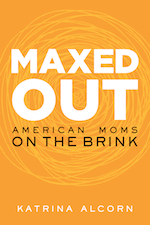Book Clubs
Is your book club reading Maxed Out? Below is a discussion guide you may want to use.
Discussion Guide
Maxed Out lends itself to conversations that can lead to both personal and workplace transformation. Here is a starter list of questions to get your book club talking. Pick and choose the ones that are most appropriate for your group.
1. Having it all—Maxed Out is the story of one woman’s breakdown and eventual “breakthrough” that she can’t do it all.
- After reading the book, what do you think? Can women “have it all?”
- Why or why not?
2. Book structure—Maxed Out is primarily written as a memoir, with mini-essays at the end of each chapter that address the bigger picture.
- What do you think about the structure of this book?
3. Self-help—In Chapters 5 & 6, the author describes her experience with self-help and cognitive behavioral therapy (CBT). CBT helps her learn to manage her feelings of anxiety and guilt about being a working mom, but later, after she has another baby, it stops working.
- How do you think the author feels about self-help?
- What self-help strategies have you tried to manage your busy life? Did they work?
- What are the limits of self-help in managing stress?
4. Judging others—Starting on page 85, during Ruby’s first birthday party, the author has a tense conversation with another mom who seems taken aback that Ruby is in full-time daycare. At the end of the chapter (pages 92-95), Alcorn reflects on all the ways mothers judge each other.
- Have you ever felt judged about your decision to work or not work?
- To have kids or not have kids?
- Do you find yourself judging others for these decisions?
5. Paid time off—The author says that the U.S. lags behind the rest of the developed world when it comes to policies like paid maternity leave and paid sick days.
- Why does the author think this is so important? After all, she had these things, and in the end it wasn’t enough.
- Would these policies make a difference in your life? In the lives of people you know?
6. Mothers as managers—In Chapter 7 the author describes how being a parent made her a better manager at the office.
- Do you think this is a common experience?
- What other life experiences do you think make people better at their jobs?
7. Men—Maxed Out focuses on the affect of work-family stress on mothers, but they aren’t the only ones affected by this stress.
- Where do fathers fit into this conversation?
- What about people who don’t have kids, but want to have a life outside of work?
8. Working less—On pages 145-147, the author summarizes research that shows working long hours “kills profits, productivity, and people” and proposes that we all find ways to work less.
- Do you think you or your coworkers work too much?
- What would it take to work less? How would this impact your current job, your coworkers, and your life in general?
9. Mommy track—In Chapter 11, the author describes how her attempt to speak at a conference while still on maternity leave backfired after being up the night before with a sleepless baby. When she gets home, she struggles to explain to her husband why she insisted speaking at the conference. Years later, though, she realizes she felt desperate not to get “mommy tracked” at her job.
- Have you ever found yourself pushing beyond what you know are your limits?
- Why or why not?
10. Parents vs. non-parents—When the author returns to work from maternity leave, she begins having more misunderstandings with co-workers (Chapters 12-14). There are complaints about her schedule, and her pumping breastmilk, and she finds that she has less patience for workplace drama. She begins to see the world divided into two camps, parents and non-parents.
- Have you ever found yourself falling into one of those camps, and feeling resentment toward those in the other camp?
- Where does this resentment come from, and what could be done about it?
11. Mommy Guilt—In Chapter 16, Ruby has trouble transitioning into kindergarten. Despite all the work the author did to “beat back” her Mommy Guilt, it returns in full force. “Mommy Guilt is like herpes,” she says. “You never really get rid of it.”
- How much of our guilt is self-imposed, and how much of it is beyond our control?
- Why don’t fathers seem to experience guilt at the same extent that mothers do?
12. Everything’s fine vs. total collapse—On page 229 the author writes,
When you’re working and raising kids, like is held together with a very delicate string. One tug of the string—an illness, a sleepless night, a flat tire—and the whole apparatus, your whole carefully constructed life starts to come undone.
- Have you ever found yourself teetering on that line between “everything’s fine and total collapse”?
13. Workplace bullies—In Chapters 17-18, the author describes two clients (Vlad and April) who each bring a kind of toxic energy into the office. Alcorn admits that she is afraid to stand up to either one for fear that they will fire her company.
- Have you had any brushes with workplace bullies?
- How have you handled them, or wish you’d handled them?
14. Lean in vs. max out—On pages 250-252, the author critiques Sheryl Sandberg’s advice that women should keep their “foot on the gas” (this advice was later shortened to the much catchier “lean in.”) On page 251 Alcorn writes:
If there’s one thing we need to do to make room for more women in leadership, it’s not telling them to “Keep their foot on the gas pedal.” For many of us, that’s the surest way to drive ourselves over the cliff. And it perpetuates the widely held belief that women are the source of their own problems, that if we’re not getting ahead in our careers, it’s our own damn fault. We’re just not trying hard enough! Likewise, if we’re overwhelmed with the competing demands on our time, that’s our fault, too; we’re simply not managing our time well!
- What do you think? In what ways do women need to “lean in?”
- In what ways do policy makers and corporate leaders need to “lean in?”
15. Embracing work—In Chapter 19, the author goes to the TED conference and returns home invigorated and determined to make her job work.
- In what ways does your work feed your soul, or how would you like it to?
- What would you like to be doing five years from now?
16. Job stress—In Chapter 20, the author and her husband both find themselves in a perfect storm of job stress. At the end of the chapter (p. 275), Alcorn writes that “problems at work are more strongly associated with health complaints than any other life stressor, more than even financial or family problems.”
- What could be done at your workplace to decrease employee stress?
17. What the answer?—By the end of the book, the author has made a case for the epidemic levels of job stress in America, not only for mothers, but for all kinds of people who struggle to work and have a meaningful life. Throughout the book, she offers various ideas for chipping away at the problem, including better part-time options (page 23), Results-Only Work Environments (page 206), a GI Bill for Moms (page 166), and paid parental leave that includes fathers (page 350).
- What do you think? What changes would you like to see?
18. Call to action—At the end of the book (pages 355-362) the author lists 10 things that everyone can do to “create change in your home, in your heart, at your workplace, or in society at large.”
- Which thing on the list speaks most to you?
- Are there other things do you think should be on this list?





{ 1 comment… read it below or add one }
We absolutely love your blog and find the majority of your post’s to be just what I’m
looking for. Do you offer guest writers to write
content available for you? I wouldn’t mind publishing a post or elaborating on a few of
the subjects you write about here. Again, awesome web site!
{ 2 trackbacks }